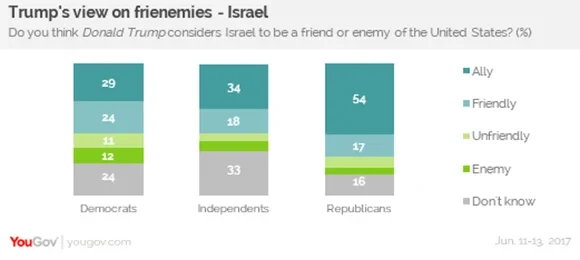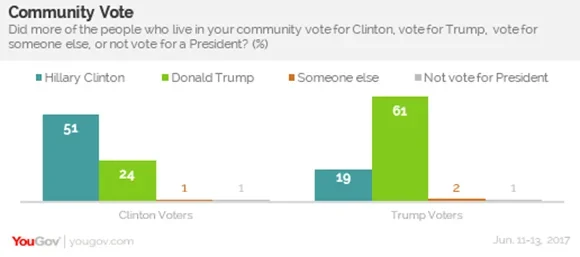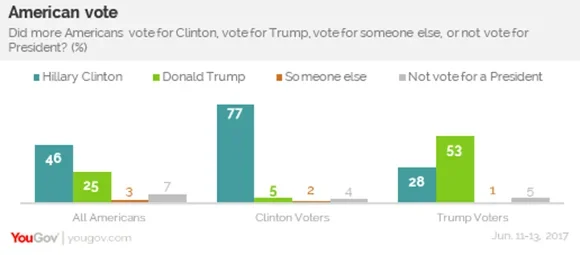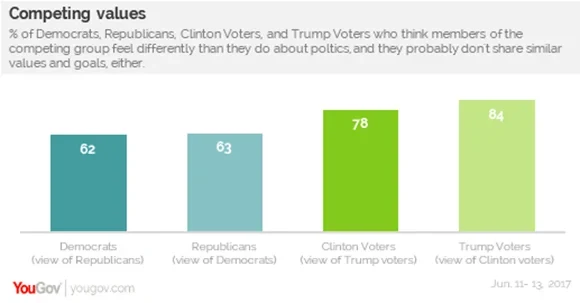84% of Trump voters think Clinton voters feel differently than they do about politics, and they probably don't share similar values and goals, either
Most Americans live in a world where there is more agreement than disagreement when it comes to politics. The social gap is increasing; and may have implications for how Americans view their political opponents.
In the latest Economist/YouGov Poll, nearly three in four Democrats say most of their close friends are Democrats, too. And the same percentage of Republicans mostly have close friends with the same political orientation as their own.

Those under 30 are more likely to have Democrats for friends, while the close friends of those 65 and older are more likely to be Republicans. Independents are less than half as likely as partisans to say they know the political affiliation (and the vote) of their close friends. Some people don’t talk about politics very much, and the less interest in and the less attention one pays to politics, the less likely one is to know what even close associates think.
But social and family life for many is a political echo chamber. The families of 73% of Clinton voters and 77% of Trump voters voted the same way as the poll respondents did. Most people’s friends vote the same way as they do. A majority of Clinton voters (and even more Trump voters) live in places where most people think like they do, at least politically.

Those similarities in political thinking may also lead to the perception that the rest of the country is on the same side. The President himself made the claim in January that Democrat Hillary Clinton’s nearly 3 million national vote margin would have been wiped out, and he would have won the popular vote as well as an Electoral College majority, had millions of “illegal” votes not been cast. Half of Trump’s voters agree with him, and believe he won more votes than Clinton. Hardly any of Clinton’s voters say this.

Overall, the country is divided on whether or not there were in fact millions of illegal votes. 48% say it’s likely true, 52% disagree. And agreement on this question doesn’t only come from Trump voters. More than a third of Democrats agree that the claim of millions of illegal votes can underlying is “definitely” or “probably” true, too. The poll didn’t ask directly whom they believe benefited from those votes.
There is an underlying distrust of those on the other side of the political spectrum. More than six in ten Republicans and six in ten Democrats think those on the opposite side don’t just differ with them politically, but also don’t share the same values and goals. And the sense of difference is even greater among Trump voters describing Clinton voters, and vice versa.

Independents were asked about both political parties, and unlike partisans, a majority of them see similarities with themselves. 51% of independents think Republicans share their values, 57% say Democrats do.
The skepticism about the other side has increased in the last ten years. In March 2007, CBS News asked the same questions and found then that only about half of Democrats and Republicans believed that those on the other side did not share their goals and values.
This political self-segregation may be hardening political divides. Those who live in communities or socialize mostly with those who agree with them politically appear more likely than others to view those who disagree politically with them as disagreeing with them on values and goals that have nothing to do with politics. Since so many partisan voters live and socialize with those who agree with them, the sample sizes are small, but the pattern is there.
As for the President’s standing in this poll, there has not been much change in the last few weeks (although the percentage disapproving of how Donald Trump is handling his job has dropped from last week’s all-time high). 39% approve of how the President is handling his job, and 52% disapprove.








